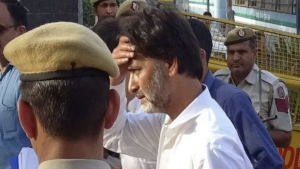NEW DELHI: The Delhi HC on Friday directed that separatist leader Yasin Malik be virtually produced before it from jail in connection with the NIA‘s plea seeking death penalty for him in a terror funding case.The Jammu and Kashmir Liberation Front leader, who is currently serving a life sentence in the case, does not need to be produced in person, a bench led by Justice Siddharth Mridul ruled, modifying an earlier order that demanded his physical presence. The bench granted the jail superintendent’s application and cited security concerns. Justice Anish Dayal was also a member of the bench, which made the decision. “In view of the matter, the order dated May 29, 2023 is necessarily modified to the extent that the jail superintendent is directed to produce Yasin Malik in the present appeal through video conferencing alone on August 9 and not in person,” the bench stated.Malik, who is currently serving a life sentence in the case in Tihar jail, is required to appear before the high court on August 9 when the NIA’s request for an increase in sentence is scheduled to be heard. The high court issued these warrants on May 29. A President’s order prohibiting Malik from being “moved from the Tihar Jail” was presented to the court by the Delhi government’s standing attorney. He stated that when he recently made an in-person appearance before the Supreme Court, the Court likewise conveyed its unhappiness. The jail staff said in the appeal that Malik was a “very high risk prisoner” and that it was essential not to physically produce him in court in order to preserve public safety and order. Ajay Kumar Bhalla, the union home secretary, was alerted to a “serious security lapse” when the imprisoned separatist leader recently appeared in the Supreme Court in relation to a kidnapping case against him. Malik came before the Supreme Court’s bench on July 21 in connection with the CBI’s appeal of a ruling made by a trial court in Jammu on September 20, 2022, regarding the 1989 kidnapping of Rubaiya Sayeed, the daughter of the then-Union Home Minister Mufti Mohammad Sayeed. Without the court’s consent, armed security guards transported him in a prison van to the high-security apex court grounds. Later that week, the Department of Delhi Prisons ordered an investigation into the lapse and suspended four employees due to Malik’s physical appearance before the highest court. Malik received notification from the high court on May 29 regarding the NIA’s request for the death penalty against him in the case involving funding for terrorism, saying, “Let warrants of production be issued against Yasin Malik, before this Court on the next date of hearing.” List on August 9, 2023. Malik, the leader of the Jammu Kashmir Liberation Front, was found guilty of numerous charges under the strict Unlawful Activities (Prevention) Act (UAPA) and the Indian Penal Code on May 24, 2022, and a trial court in this location sentenced him to life in jail. Malik was found guilty and given a life sentence after entering a plea of guilty to all of the charges, including those brought against him under the UAPA. The NIA highlighted in its appeal that a terrorist cannot receive a life sentence just because he entered a guilty plea and choose not to go to trial. The NIA has argued for increase of the sentence to the death penalty, claiming that if such feared terrorists are not executed due to their guilty pleas, the sentencing guidelines would completely erode and terrorists would have a way around it.The NIA argues that a life sentence is excessive given the terrorists’ crimes against the country and the families of fallen soldiers, and that the trial court’s finding that Malik’s crimes did not qualify as one of the “rarest of the rare cases” warranting the death penalty is “ex-facie legally flawed and totally unjustifiable.” The agency has emphasised that it has been established beyond a reasonable doubt that Malik was the leader of terrorist activities in the Valley and had been “masterminding, planning, engineering and executing armed rebellion in the Valley in an attempt to usurp the sovereignty and integrity of a part of India” with the assistance of feared foreign terrorist organisations.An act of terrorism is not a crime against society; rather, it is a crime against the entire nation; in other words, it is an act of “external aggression,” “an act of war,” and a “affront to the sovereignty of nation,” according to the plea. Accordingly, withholding the death penalty from such dreaded terrorists will lead to a miscarriage of justice. The trial court stated that Malik’s actions struck at the “heart of the idea of India” and were aimed to forcibly secede Jammu and Kashmir from the Union of India, rejecting the NIA’s request for the death penalty. However, it had been highlighted that the case did not meet the “rarest of rare” criteria for the death punishment. The life sentence was given for two offences, section 121 of the IPC (waging war against the Indian government) and section 17 of the UAPA (raising funding for terrorist acts). Unless the sentence is mitigated by the authorities, life in prison means confinement until one’s last breath, according to the Supreme Court. According to sections 120 B (criminal conspiracy), 121-A (conspiracy to wage war against the government of India), sections 15 (terrorism), 18 (conspiracy for terrorism), and 20 (being a member of a terror organisation), the court had sentenced Malik to 10 years in prison in total.

